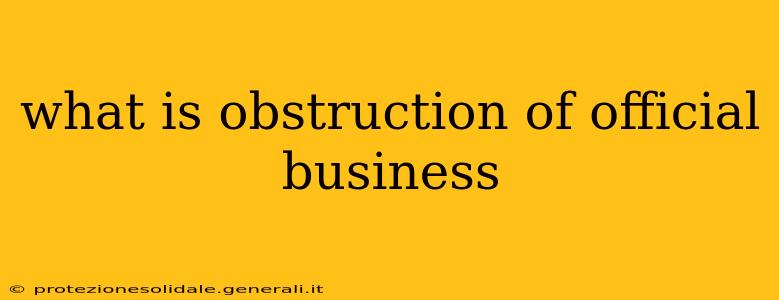Obstruction of official business, sometimes called interference with a public officer, is a crime that involves hindering or impeding a government official or employee from performing their lawful duties. It's a serious offense that varies in specifics depending on the jurisdiction, but the core concept remains consistent: it's illegal to actively interfere with someone carrying out their official job.
This isn't just about physically blocking someone; it encompasses a range of actions designed to frustrate or prevent the official from doing their work. The severity of the charge usually depends on factors like the nature of the interference, the official's role, and the resulting consequences.
What Constitutes Obstruction of Official Business?
This is where the specifics get important, as the actions considered "obstruction" are diverse. Here are some examples:
-
Physical Interference: This is the most straightforward form. Physically blocking an officer's path, assaulting them, or using force to prevent them from entering a location all fall under this category.
-
Verbal Harassment or Intimidation: Constantly yelling, swearing, or making threatening statements towards an officer to discourage them from performing their duties. This is particularly relevant during traffic stops, arrests, or investigations.
-
Providing False Information: Deliberately lying to a police officer, a tax auditor, or other official during an investigation to mislead them and hamper their progress. This could range from giving a false name to providing fabricated documents.
-
Destruction or Concealment of Evidence: This is a common and serious form of obstruction. Destroying evidence relevant to an investigation, hiding it, or tampering with it to prevent its discovery is a clear violation.
-
Refusal to Cooperate: While you generally have the right to remain silent, refusing to cooperate altogether, particularly when legally required to do so (like providing identification to a police officer during a legitimate stop), can be construed as obstruction. The context is critical here—passive non-compliance is different from active resistance.
-
Use of Technology: Modern technology has introduced new ways to obstruct. This can include using drones to interfere with police operations or using technology to hack into government systems to hinder investigations.
What are the Penalties for Obstruction of Official Business?
Penalties for obstruction of official business vary widely based on the jurisdiction, the specific circumstances of the offense, and the severity of the interference. They typically range from fines to imprisonment, and can significantly increase if other crimes are involved. For instance, resisting arrest while obstructing an officer will often lead to more severe penalties than simple obstruction alone.
How is Obstruction of Official Business Different from Other Crimes?
The key difference lies in the target of the crime. Obstruction of official business specifically focuses on impeding the performance of a government official's duties. While it can overlap with other crimes (like assault, resisting arrest, or perjury), the core element is the interference with official functions.
What are some defenses against charges of Obstruction of Official Business?
A successful defense often hinges on demonstrating that the actions taken were not intended to obstruct official business, or that the official’s actions were unlawful or exceeded their authority. This often requires careful legal representation and a strong understanding of the specifics of the case.
Can a Private Citizen be Charged with Obstruction of Official Business?
Yes, absolutely. Obstruction of official business is not limited to interactions with law enforcement. It applies to any government official, regardless of their agency or level of authority. This could include interfering with a health inspector, a building code enforcement officer, or a tax assessor.
This information is for educational purposes only and is not a substitute for legal advice. If you face charges of obstruction of official business, you must seek the advice of a qualified attorney in your jurisdiction.
